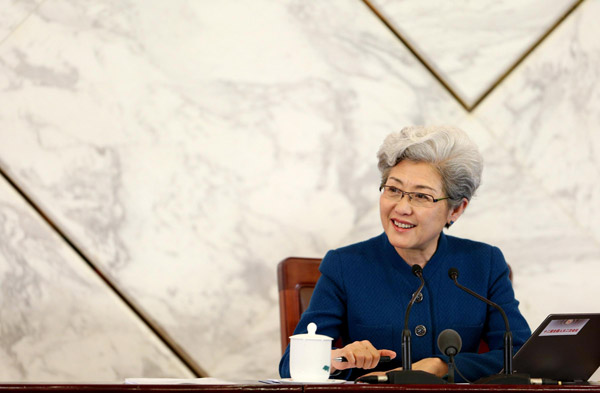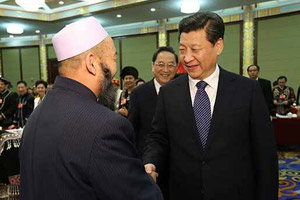 Large Medium Small
Large Medium SmallRobust response comes after critics hit out at increase in country's military spending
 |
|
Fu Ying, spokeswoman for the second session of the 12th National People's Congress (NPC) , speaks during a press conference in Beijing March 4, 2014. [Photo/Xinhua] |
Peace can only be preserved with strength, the spokeswoman for China's top legislature said on Tuesday, in one of the strongest responses to concerns over growing military power.
Meanwhile, analysts said that increased defense spending is part of China's modernization drive amid growing challenges from some Asian countries that keeping raising their military budgets.
Fu Ying, spokeswoman for the second session of the 12th National People's Congress, said that as a major, China is responsible for regional peace and security.
But "based on our history and experience, we believe that peace can only be maintained by strength", she said.
Fu said China, whose military policy is entirely defensive in nature, has never treated any country as an enemy or a threat.
 |
| 2014 two sessions |
"We have heard such concerns. Indeed, certain countries have been selling the idea of China as a major threat," Fu said. "But we Chinese might ask, can a prosperous country such as China really achieve peace without a strong national defense?"
She said China supports disputes being resolved through negotiations. However, it will "respond effectively" to provocation by those ready to sabotage regional security and order, "for the sake of China's own territorial sovereignty, as well as for the protection of regional order and peace".
China's defense budget, after years of double-digit growth, stood at $117.7 billion in 2013, as the United States remained the world's biggest defense spender with a budget of $600.4 billion.
China's defense budget for this year is expected to be announced on Wednesday when the top legislature begins its meeting.
Qian Lihua, a major general who used to head the Foreign Affairs Office under the Ministry of National Defense, said China's defense spending is reasonable and moderate, and its growth depends on the nation's economic performance.
The country's defense spending is rising along with other kinds of social spending, such as education and social welfare, he said. "It is unrealistic and unreasonable for China's defense spending to remain at the same level," he added.
Qian, also a member of the National Committee of the Chinese People's Political Consultative Conference, said many Asian countries have increased their defense budgets.
Asia's defense spending surpassed that of the European Union in 2012, and reached $320 billion in 2013, Qian said.
The increase was driven by geopolitical changes in Asia, with the emergence of "hot" regional issues, territorial disputes and an Asian strategy adjustment by some countries, Qian said.
Zhong Zhenming, an international relations scholar at Tongji University in Shanghai, said some countries have continued to create an unstable environment for China while accusing it of becoming a regional threat.
China's increased military strength is partly in response to provocative moves taken by some countries, who should review their own polices first, Zhong said.
Chen Kai, vice-chairman of the China Arms Control and Disarmament Association, said a considerable part of China's military strength has been aimed at securing world peace, including anti-piracy patrols in the Gulf of Aden and the Chinese navy's involvement in escorting shipments of Syrian chemical weapons this year.
Chen said that compared with China's defense strategy, Japan has repeatedly adopted aggressive policies, and it is absurd for such countries to accuse China of being a military threat.
Ren Yuanzhe, a researcher at China Foreign Affairs University, said China requires more financial support, as it is experiencing military reforms under the new leadership.
|
 |
 |